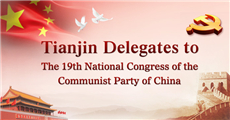The city of Tianjin spends heavily on luring top minds, according to a recent talent attraction plan it released at the opening ceremony of the second World Intelligence Congress held in the city on May 16.
Its vice-mayor Sun Wenkui explained the Haihe Talent Action Plan, which eases the residence policy targeting highly educated and highly skilled people with senior professional titles and entrepreneurial or other urgently needed talents.
Under the plan, holders of a doctoral degree from a full-time university of any age can obtain a Tianjin hukou, or local urban permanent household registration, while the holders of a master's or bachelor's degree may be no more than 45 and 40 years old, respectively.
Technicians with deputy senior professional designations or above, as well as those who have obtained professional qualifications as an international actuary, chartered financial analyst, financial risk manager, certified public accountant, certified tax agent, certified architect, certified survey and design engineer, certified asset appraiser or lawyer are assured of a hukou.
Graduates of higher vocational colleges who have worked in Tianjin for more than one year or graduates of secondary vocational schools who have worked in Tianjin for no less than three years, with professional qualifications of high-level, technician and senior technician may claim a Tianjin hukou subject to certain age restrictions.
Entrepreneurial talents who have operated a business steadily in line with Tianjin's industrial policy for more than one year and paid 100,000 yuan ($15,680) in tax can also secure a local hukou without any age limit.
The hukou requirements for professionals badly needed by key enterprises in strategic emerging industries like artificial intelligence, bio-medicine and new energy materials can be determined by their employers.
All the talents mentioned in the plan can register their permanent household as their or their spouse's residence in which they hold property rights, or as a collective hukou of their employer.
Talents without any residential property rights or employer or those talents whose employer has no collective hukou can register their hukou at a collective one designated by the public service organizations of the city or the district's human resources and social security authorities.
Apartments will be built for talents and purchase restrictions on housing are eased for high-level talents. Foreign talents can be covered by the public housing funds as local residents.
Meanwhile, a "green card" system is launched to provide a "one-stop" service to the talents.
Top-notch talents and leading professionals will enjoy additional services such as prioritized medical care for their parents, employment for their spouse and education for their children.
Foreign talents who have children in an international school can receive an annual subsidy of 150,000 yuan at most for three consecutive years.
Overseas talent workstations approved by the municipal talent management authorities will be granted 150,000 yuan every year. Specially-employed people for talent attraction will receive a yearly subsidy of 50,000 yuan.
Intermediary agencies, social organizations and individuals that have contributed to the plan will be subsidized up to 200,000 yuan.
Under the city's previous hukou policy, there were three ways in which people could secure a local hukou.
Full-time university graduates who are under the age of 35, employed by government organs, social organizations, public institutions, enterprises and private companies and have paid social insurance for a certain amount of time could obtain a Tianjin hukou.
Enterprises and research institutes moving to Tianjin could register an unqualified employee's hukou in Tianjin if more than 50 percent of the employer's workers were qualified.
The points system for household registration refers to employment, accommodation, educational background, skill levels, tax payments, and credit records, among other things, being converted into points. Migrants are able to change their household registration status after reaching a specified number of points.

 Daily life
Daily life




